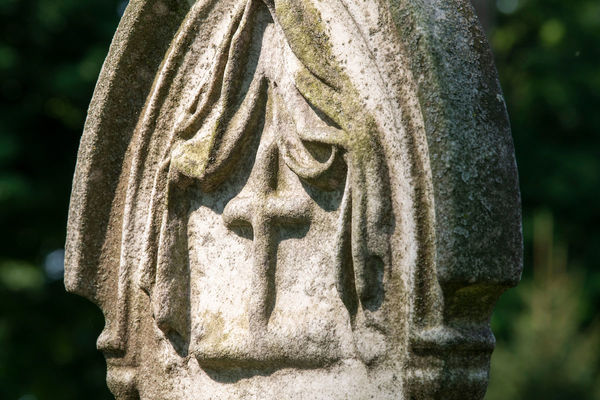
Leon Glon has been doing quiet but important work at the University for more than 30 years. As sexton (manager) of Cedar Grove Cemetery, he helps families through the process of burying their loved ones, and he oversees the final resting place of those who are interred there.
“To bury the dead is one of the Corporal Works of Mercy, so it’s important to me,” he said.
Cedar Grove stretches along the southern edge of campus, directly west of Notre Dame Avenue. It is an active cemetery, having provided 94 interments last year.
“I try to make everything personable. I want the process to go smoothly for them, to ease the stress during that difficult time,” he said. Glon works with families to schedule and plan the committal services of their deceased loved ones. He is there for the families, helping them select and design monuments, telling them what to expect during the services, and covering details that they may not think of in the midst of their grieving.
 Leon Glon, pictured, is the sexton Cedar Grove Cemetery along Notre Dame Avenue on campus. He works with families to schedule and plan the committal services of their deceased loved ones. (Photos by Barbara Johnston/University of Notre Dame)
Leon Glon, pictured, is the sexton Cedar Grove Cemetery along Notre Dame Avenue on campus. He works with families to schedule and plan the committal services of their deceased loved ones. (Photos by Barbara Johnston/University of Notre Dame)
Glon also coordinates an aftercare program (cards are sent to families on the anniversary of their loved one’s death) and memorial Masses that families request. In addition, he coordinates three memorial Masses that are held every year — on Memorial Day, Alumni Weekend and All Souls Day.
When people ask about ancestors who may be buried at Cedar Grove, Glon does some genealogy research to answer their questions.
He explains, “This cemetery is very old. It was laid out by Father Badin before Father Sorin founded the University. We have a burial here that dates to 1836, and the University wasn’t founded until 1842. This was the first and only Catholic cemetery in the area, and burials came from as far away as Rolling Prairie and Plymouth. Not many people know it, but the pioneer founders of this area are buried here: Pierre Navarre, Alexis Coquillard and Joseph Bertrand.”
Glon is a Certified Catholic Cemetery Executive, a designation given through the Catholic Cemetery Conference for the following: years of service in the cemetery industry, hours toward continued education, serving on state or national committees and submitting articles for publication.“I encourage people to plan these things ahead of time,” he said. “If they don’t do it for themselves, then for their spouses and children. People can get what they would like, rather than leaving those decisions to their spouse or kids.”Because of the cemetery’s rich history, Glon enjoys giving tours of Cedar Grove, and he wants people to know they can request a tour. He also aspires to make sure the Notre Dame community is aware that all full-time faculty and staff, alumni and retirees with a certain number of years of service have the option to purchase space at Cedar Grove Cemetery. (Visit go.nd.edu/cedargrove for information.)

“Leon takes a ministerial approach to his work,” Micki Kidder, vice president of University enterprises and events, told an NDWorks reporter recently. “What happens at Cedar Grove Cemetery is so beautiful. A lot of care goes into the environment, and Leon is behind that. Of course, the setting is lovely, but it’s the care that he puts into each celebration of life that makes it so special. This week alone, nine families gathered at Cedar Grove to celebrate the life of a loved one. He ensures that each family has a peaceful, prayerful celebratory rite.”
Those burial rites are important, both for the families and for the deceased. Just as burying the dead is a Corporal Work of Mercy, praying for the dead is a Spiritual Work of Mercy, according to the Catholic faith. (Visit go.nd.edu/mercy to learn more.) The Catholic faith provides believers much comfort regarding the afterlife and the power of prayer. For example, prayer can move souls from purgatory to heaven, according to the faith.
Glon says, “I enjoy my work; it’s a Corporal Work of Mercy and that’s a big responsibility. Last year I was able to help 94 families — that is very rewarding and fulfilling, and I feel very blessed."
Originally published by at ndworks.nd.edu on August 09, 2019.